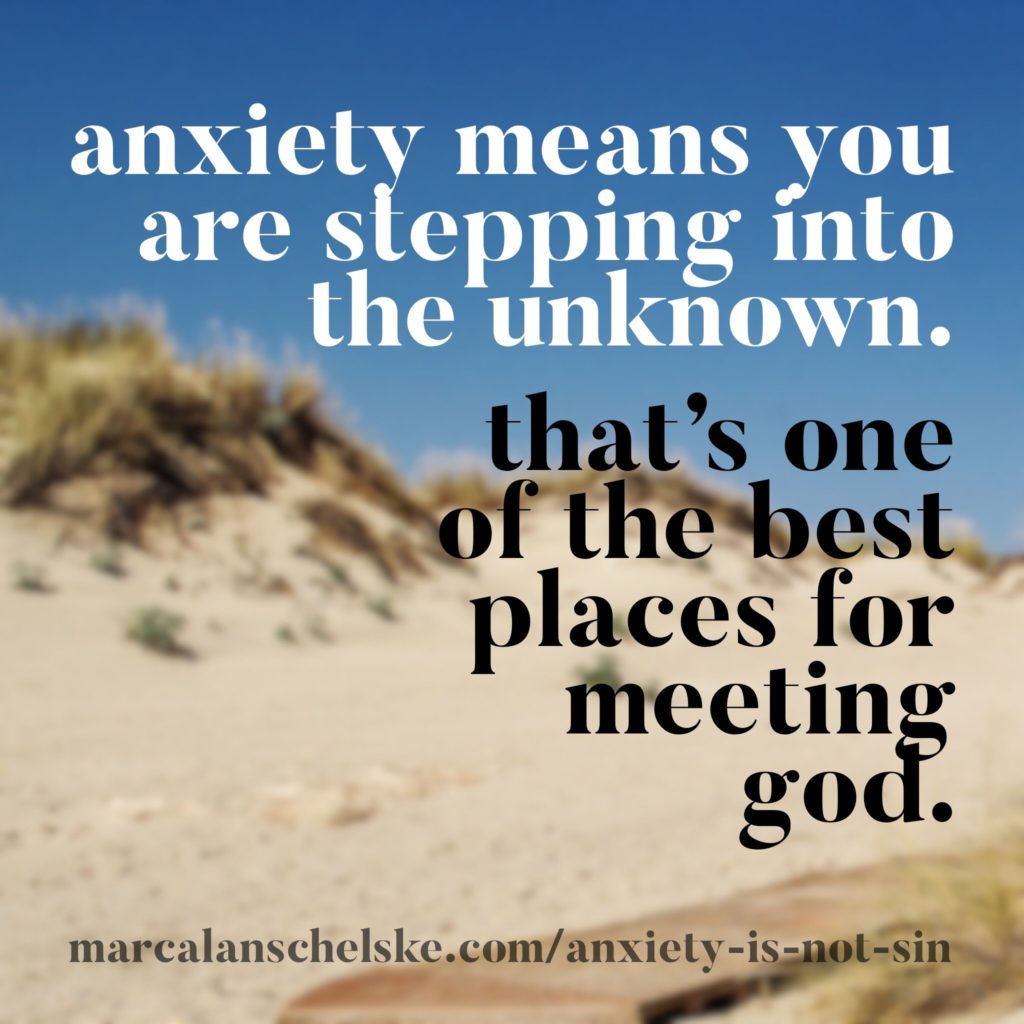9 min. to read.
Not long ago I sent a question to the folks on my email list. I asked, “What questions do you have about emotions and faith?” The flood of responses surprised me. Clearly, this is a real-life struggle for many of us.
One particular topic surfaced repeatedly. It was summarized best by this line from Errol H. He said, “I always wrestled with feeling anxious or fearful about circumstances and how that squares with my faith or lack thereof. I have always believed that it is a lack of trust at the core.”
So many people shared this same struggle. Why do I feel anxious? If I feel anxiety, does that mean I’m not trusting God? Is my worry a lack of faith?
There is so much pain that lies behind these questions. We need to talk about that.
Somehow we’ve picked up the story that having faith in God means never feeling doubt or fear. We imagine that a truly committed and faithful person will be settled in their spirit, confident in God’s presence, and optimistic about the future—always!
That’s a beautiful picture. But is it something you’ve ever experienced? My own life, the biographies of heroes of our faith, and even scripture suggest otherwise. Questions, uncertainty, even doubt are more common than we want to admit. Life is hard, and the trials we face can raise questions about our future. Then enters anxiety.
If we are comparing ourselves to that picture of perfect faith, of course, we find ourselves lacking. So, when we feel anxiety, we assume that the problem must lie with us, right? Our commitment is too weak. We’re not spending enough time in scripture. Our faith just isn’t strong enough.
So, does having anxiety must mean I’m a failure as a person of faith? No! A hundred times no.
Not a sin. A normal part of life.
Hear me closely. Feeling anxiety is not a sin or a moral failure. Plenty of people in scripture experienced what we today would call anxiety—and it didn’t spell the end of their faith or relationship with God.
Moses was anxious about how the Egyptians would receive his message that God wanted the slaves set free. Elijah felt crippling anxiety in the aftermath of his great victory against the priests of Baal.
David wrote, “I am worn out calling for help; my throat is parched. My eyes fail, looking for my God.” (Ps. 69:3) Job, in the middle of unimaginable trauma, exclaimed, “Why is light given to those in misery, and life to the bitter of soul, to those who long for death that does not come?” (Job 3:20) Even Jesus, experiencing the trauma of crucifixion and deep spiritual alienation, cried out, “My God, my God, why have you forsaken me?” (Matt 27:46)
Anxiety doesn’t mean that you are a spiritual lost cause.

The emotional response to uncertainty.
Whether you feel anxiety or not isn’t a good measure of your faith. Why? Because anxiety and faith are two different kinds of things.
Faith is a choice we make. At its heart, faith is essentially trust, and trust is a conferred relationship status. Based on our experience of a person and the information we have about them, we decide whether we are going to treat them as credible, dependable, and committed to our good.
While we often use more spiritual language, faith in Christ is the same. Based on our experience of God, God’s people, what we’ve learned in scripture, and our life experience, we decide to relate to God as credible, dependable and committed to our Good. We determine whether we think Christ is a good Lord, worthy of following.
There is undoubtedly an emotional component to this, as there is to every decision we make. And yet, it all comes down to a choice, an act of will.
Anxiety, on the other hand, is not something we choose. It is an emotional reaction, a gnawing, low-grade fear.
Feeling anxiety means you are being stretched. You are on the edge of your comfort zone. It may also indicate you perceive some danger or threat. (For some of us it’s more persistent. More on that in a moment.)
This is why worry or anxiety are not good measures of your faith. Faith is an act of will, something you choose. Anxiety is an emotion, something that happens to you. Do you see why comparing them is fruitless?
It’s entirely possible to have made a choice to trust God, and still feel anxious. We aren’t in control of when we have emotions. They just happen to us. They are neither good nor bad. They are a form of data, communicating something to us from our deep inner places. (For more on this idea, check out my book The Wisdom of Your Heart!)
You might say, “Wait, doesn’t scripture tell us that perfect love casts out fear?” Sure. But none of us have been made perfect in love. That won’t happen this side of eternity. Our entire journey of faith is about learning to love and trust God more. That means there’s always further to go!
No matter how faithful we are, there’s always some new uncertain horizon ahead. We may trust God’s love for us more than we did in the past, but there are still new kinds of uncertainties ahead that we haven’t yet imagined.
One of the chief prompts for anxiety is uncertainty. That happens when we are at the edge of our comfortable experience. We may be less likely to feel fear because years of experience with God has grown our trust. That’s great! But that doesn’t change the reality that part of maturing in Christ means facing new things, and new things are always (as a result of being new) uncertain. No matter how spiritually experienced or mature we are, the possibility of anxiety remains.
How to meet God in your anxiety.
So, what does all this mean practically? When we experience anxiety how can we—as people learning to live with faith and love—walk with it constructively?
1. Don’t shame yourself for anxiety.
Feeling anxiety is a normal human emotion. You’ll feel it from time to time, no matter how strong your faith. Don’t beat yourself up because of it. Instead, decide to notice it and learn from it.
2. Follow the thread of your anxiety.
Because anxiety is an emotional response, it is rooted in perception. Fear is the emotion we feel when we perceive that we are under threat. Anxiety is a low-grade form of fear.
So when you feel anxiety, examine it. What is the threat you perceive? Is this threat reasonable? Is it attached to circumstances you can change or those out of your control? Is your level of fear proportionate to the size of the threat?
Follow the thread of your anxiety until it brings you to the place in your heart feeling threatened.
3. Invite the Spirit into your place of fear.
Afraid you won’t be able to make your mortgage this month? Worried about how people will see you because of something you said? Afraid to choose because you don’t know which outcome will be better for your family?
Once you identify the source of your anxiety, you have something specific to bring to God in prayer. Then you can pray things like this: Spirit, help me see the truth. Why am I feeling this way? Why does this particular thing challenge my trust? Am I seeing this accurately?
You also now a specific context in which to watch for God’s work. Perhaps God has provision you didn’t expect. Maybe God wants to grow your trust in that particular area of your relationship. Perhaps God wants to show you how you’ve taken some small thing, and by ruminating on it for so long, you’ve constructed a tower of fear that’s truthfully empty.
4. Get help for persistent anxiety.
For most people anxiety is a periodic experience, but for some, it persists. If you live with an ongoing cloud of anxiety that never seems to break, that can be an indication of something deeper that needs attention.
Those who have PTSD, for example, such as abuse survivors, combat veterans, first responders and survivors of catastrophes, will frequently have persistent anxiety. This fog of anxiety originates in their unresolved trauma and filters their entire experience.
This kind of fear has less to do with current reasonable threats, and more to do with what happened in their past. It’s the emotional and psychological equivalent of scar tissue. Like any scar on our bodies, this has no reflection on a person’s faith.
If you’re living with persistent anxiety like this, you need help outside of yourself. A skilled therapist has the tools to help you work through the wound of PTSD. God works in that kind of healing too.
Anxiety is a human experience, common to all of us—even those who are spiritually experienced and mature. You don’t choose to feel it. It happens to you, and it is not a reflection on the quality of your heart for God.
Look, anxiety on its own is uncomfortable. There is no need to add a layer of shame. Feeling anxiety doesn’t mean you are a failed Christian.
It suggests that you are stepping into the unknown—and the unknown is one of the very best places for meeting the Spirit.


I’ve come to ask myself what it is that I want to happen. There seems to be a desire of some sort of outcome below the surface of anxiety (fear) and in getting to that helps me reframe it and actually come up with a prayer and perhaps wait for a plan/solution for it.
Reframing like that is really helpful. Part of the struggle with anxiety for so many is that we often feel helpless, and that makes it feel even worse. Anything you can do to take steps to be a cause toward what you want, or what you think is right, or even to actively seek God tends to help.